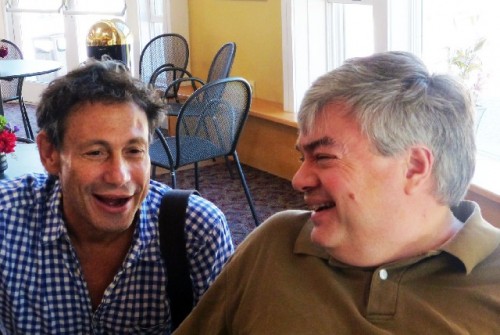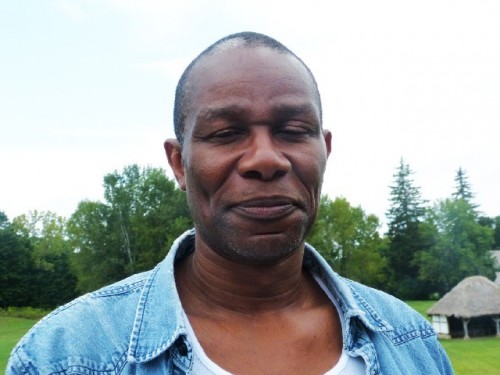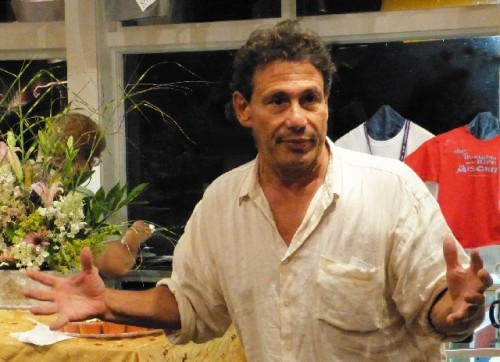Terry Teachout Part Five
New Haven and Long Wharf Theatre Then
By: Charles Giuliano - Sep 12, 2012
Terry Teachout It is interesting to see how an actor like John (Douglas Thompson) shapes a performance night after night with different audiences. Specifically in the comedy areas. John is learning. He now knows where the laughs are.
Charles Giuliano He has been studying comedy this past year.
TT He’s never done it. There’s not a lot of laughs in Othello. But he took to it instantly and now.
CG He’s been studying comedy.
TT Yeah. It was fascinating to read that New Yorker profile. He knows where the laughs may come on any given evening. Without mugging, though he mugs like Armstrong to be like Armstrong. Without mugging in that other way. He knows now how to go with the audience. To bring them to him and make the laughs register. If something goes wrong on stage he knows how to improvise.
CG What are we going to see in New Haven (Long Wharf Theatre)?
TT This play but tighter. The transitions that had to be done crudely because we were making cuts at the last minute, during the final week of rehearsal, will be smoothed out. There will be some speeches where the order of events will be changed for ease on the ear. When I first wrote the play I thought of Armstrong as a rambling story teller. I learned, and Gordon (Epstein the director) showed me, you can create that illusion but you really have to be very careful about tense and sequence. So the audience can follow you right down the narrative trail. In the last scene, for example, we transposed two speeches so it flows more correctly to the end. The two Miles (Davis) speeches, although they will contain the same content, will be recognizably different. The second one, the order of everything that happens in the speech will be changed. For the first one there’s a new transition as I mentioned earlier. It sets it up so everyone in the audience will know without question that it’s Miles Davis who is standing there. We just couldn’t fix that here. You don’t worry about it. You go with what you got.
And, of course, the play will be done with a radically different stage. At Long Wharf it is a modified proscenium, a shallow shoe box. John will be closer to more of the audience. As a result, some of the laugh lines which are being played upstage will work better in Long Wharf. On the other hand, he won’t have that wonderful house left, downstage corner which he loves to work. It is where Glaser spends a lot of his time. The set will have the same elements. We may have a tape recorder rack that looks like the one that Armstrong used. You can’t here because its tall and would block some of the views.
CG John said that you’re not allowed to use the tapes. I asked why not have some of the sound of the tapes?
TT I wouldn’t want to.
CG He said they wouldn’t give you the rights to the tapes.
TT They might have but we didn’t ask for it. What I was always concerned about is that I don’t want the audience to hear Armstrong’s speaking voice. Because John is not imitating Armstrong. No actor can do that.
CG What if it were John’s voice on the tape recorder? Listening to himself?
TT He could do that I guess. But I don’t see any point to it. I don’t want to use the tapes verbatim. Casual speech is not theatre. There are probably three or four lines in this entire play which are even close to verbatim. They’re shaped so that they flow more clearly. They sound like the way he talks. If you try to play a transcript of somebody’s conversation as a piece it’s going to be full of hesitations, false starts, turn backs. It won’t be theatrical. I would expect that people who knew Armstrong, who saw this play, would say ‘Yeah he talked like that.’ But he never talked exactly like that. Because it wouldn’t work on stage. The main thing is that I don’t want anyone to hear Armstrong’s voice because I don’t want them to compare John to Armstrong. He’s a foot taller than Armstrong was. It is interesting in the last scene where suddenly he looks like an old Armstrong. I’m afraid to ask him how he does it. It’s like his cheeks have sunk. It’s a very strange illusion. I said this at the beginning, and the script says this, “Don’t imitate Armstrong. Make an Armstrong out of yourself." That’s what I want and that’s what he did.
CG I have been working with John for four years now starting with Othello. We are trying to have dialogues documenting his roles. Most recently we posted a discussion of Iceman and his roles in O’Neill's plays.
TT If John’s career develops as it should you will want to write a book about him.
CG It’s been a complex, demanding and difficult dialogue. You talk about the spontaneity of speech. John has been insisting on editing the dialogue.
TT And I think he’s right to.
CG On this last O’Neill dialogue he went over it like a script. He has such a precise sense of language. It’s not so much to change the dialogue, but rather to make it more exact, and true to his thoughts and feelings. He wants the punctuation and diction to be precisely his.
TT John’s an intellectual. Most actors aren’t. As John will tell you, acting in and of itself, is not an intellectual art. You don’t function as an intellectual in the rehearsal room. Preparation is another matter. He is deeply profound and thoughtful about what he does.
CG That’s what we’ve been talking about. How do you develop these roles? What kind of research goes into them?
TT He has actually seen film of Armstrong that I didn’t have access to when I wrote the book. I’m agog. It’s one thing to know that somebody did this and another to watch them do it.
CG In your opinion this is not the norm for actors. That kind of preparation.
TT That kind of preparation is not uncommon for actors on the very highest level. Were you there for opening night?
CG Yes.
TT Did you hear the speeches? Did you hear Gordon compare John to the greatest actors he’s ever known? I endorse that entirely. I think that John is one of the greatest actors in the world. I think he’s on the same level as the greatest actors of the century. I think he will be recognized as such. He’s increasingly recognized as such by critics in New York.
CG When is the mainstream going to catch up with that?
TT Maybe with this play. He’s never done a role like this. Never done a one man show. He’s done very little contemporary theatre. He’s never done anything that displays him outside the context of a genius. This play is not a vehicle for him. It wasn’t written for him. It never occurred to me that John Douglas Thompson would want to do my first play. No. I’ve done some hand stitching of it in rehearsals. He’s contributed a lot to the draft that we’re performing. But I never imagined that he would do it.
CG Just what is the synergy of the rehearsal room? He’s been talking about getting just three hours of sleep at night. That there’s just Gordon and you.
TT And the stage manager.
CG Nobody to interact with or to take a break. That it all rests on him.
TT Nobody to perform for. He talks a lot about that. Gordon’s immediate response to that was that the audience will be your scene partner.
CG So what is the synergy of the rehearsal room? You were at all the rehearsals.
TT I think I missed one. My goal was to be at all of them.
CG So you’re sitting there taking notes?
TT What I’m doing is making two kinds of notes. Notes for Gordon because, if I have any suggestions, they go through him. He’s the director. I’m not back stage directing. I’m not a back seat director. I’m also noting wherever John deviates from the text, considering the possibility that his deviation might be more natural, and superior to what I wrote. There have been a lot of one and two note changes in the script which have just come out of John’s mouth. At this stage we are looking for trends in the rehearsals. As Gordon says, every beat of the play moves the ball down field. We want to make sure there are no redundancies. We don’t want the audience to get ahead of you. At an earlier stage in the process John said, “Couldn’t we say a little more about this.” The second half of the “West End Blues” scene, the one where he scats, that wasn’t their idea, but they did say “Can we have more? It really seems to be working well.” They phoned that in to me when I was at MacDowell. They did a run through of it at Martha’s Vinyard. They said, this scene is really working. Can we get more into it without turning it into a lecture recital? Gordon mentioned something else to me “You know, John can really sing the ‘Hello Dolly’ bit.” We didn’t know. How could you know that? We didn’t audition him for it.
So, I’m walking around MacDowell thinking, so, what would I do? Then the thunderbolt hit me. I almost fell down. (emphasis) Armstrong Sings in “West End Blues.” Which I’d forgotten about. I went straight back to my studio and wrote that part of the scene. I brought it with me to Lenox and we put it in. We knew immediately that it worked. At first he’s scatting along with Louis Armstrong. I assumed, he can get the first two lines and the last one. The stage directions told him to sing the first two lines then hum along with it. No. He’s learned it. Suddenly, I realized he’s going to scat the whole thing. I don’t even know how to write those solos down for the script. He’s amazing.
CG I asked John is the play is going to Broadway? Half in jest he said that if it comes to that they’re going to ask Denzel Washington.
TT (Guttural utterance) No. John is the right guy to do this show.
CG He has a concern about not having that Hollywood, marquee appeal that producers demand.
TT He has something else. He’s a critic’s darling. Every critic in New York thinks, correctly, that John hung the moon.
CG What?
TT Haven’t you heard that expression? It’s a Midwestern idiom. He’s so great he hung the moon on a hook. He’s got that credibility going for him.
CG So you think critics would want that to happen?
TT I don’t know. You can’t second guess critics. I should know. I don’t anticipate this play going to Broadway.
CG Off Broadway?
TT I would like for that to happen. It’s out of my control.
CG It seems destined for another round of regional theatre.
TT I would like for that to happen. John would like for that to happen.
CG Take it out for awhile then bring it in.
TT It’s too soon to answer these questions. We may have the answers to them in two or three weeks. Right now there’s a lot of interest in the play. Several artistic directors of regional theatres have come to see it here. I’m not going to say more than that, More will be coming to Long Wharf. The word is out about this play. First, because of the New Yorker profile and then the cover of American Theatre Magazine. The current issue. Everybody knows about this. They know that John has never done anything like this. He had a success. He was received with great éclat in Iceman. John’s the story. Not me. But is it a sort of a story that this critic wrote a play? This seems to amuse people. Gordon, quite rightly, I think Gordon is one of the three or four best theatre directors in America.
When it became clear to me, about a year ago, that this play had a chance for professional production, up to that moment it was an interesting game I was playing. At that moment, I allowed myself to draw up my fantasy list of who I would love to direct this play. It had three names on it and one was Gordon Edelstein. John was not on this list because he never occurred to me.
CG You were thinking of Denzel Washington. (Laughs)
TT No, I wasn’t. I was specifically not thinking of Denzel Washington. It never occurred to me that John, a Shakespearian actor, would have wanted to do this show. When Lizzie (Aspenlieder of Shakespeare & Company) asked me “Would you be interested in having John do a reading of it?”
CG Is that true?
TT Perfectly true.
CG That’s amazing.
TT You could have knocked me down. She called me up and said “We want to do a reading. What about John?” I probably fell out of the chair. I was staggered. I knew, specifically, having seen him in The Emperor Jones in New York, I knew he could eat this up. But Gordon, I allowed myself to fantasize. What I didn’t know was how serious and knowledgeable he is about music. He knows as much, not technically, but, as a listener, as I do. And about all kinds of music. It’s staggering. I had seen enough of Gordon’s work to know that he would be able to balance the two sides of this play. The anger and the lyricism. Gordon seems like a tough guy but he’s actually a poet. He’s so good at detail. I admire him extravagantly. So I let myself fantasize that Gordon Edelstein might direct my play.
Teachout One
Teachout Two
Teachout Three
Teachout Four




